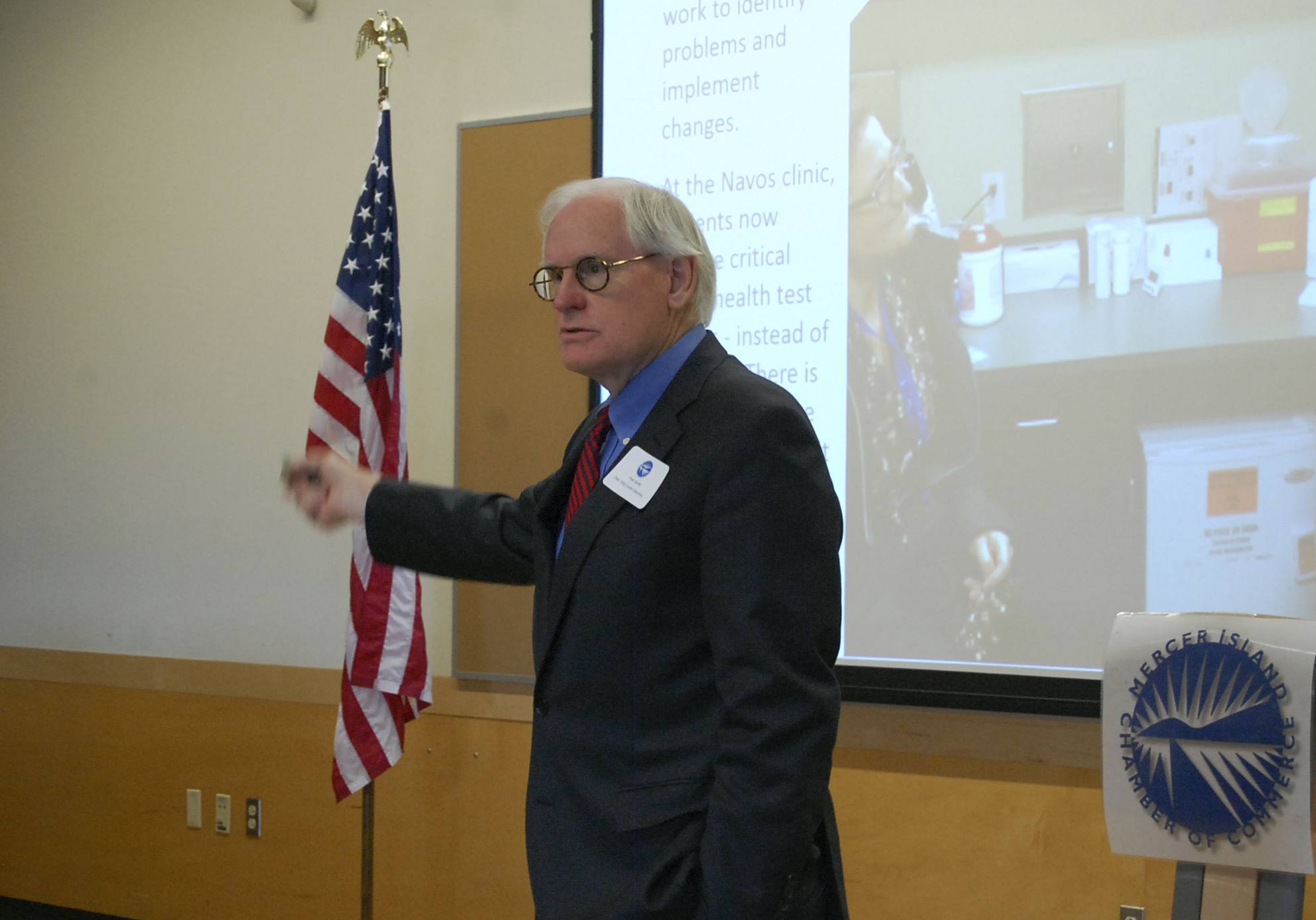Senior Deputy County Executive and Mercer Island resident Fred Jarrett tried not to discuss specific issues facing the region at the Oct. 6 Chamber of Commerce luncheon. He said that he wouldn’t talk in detail about Sound Transit or homelessness, but instead gave an overarching idea about how the King County government attempts to solve problems with more efficient and effective practices.
Jarrett, a former state senator, state representative, Mercer Island mayor and Mercer Island City Council and School Board member, now guides the Executive Leadership Team and the Best-Run Government initiative as King County Executive Dow Constantine’s right-hand man.
Jarrett is the strategic architect of King County’s reform and innovation agenda, which includes Communities of Opportunity, the Climate Action Plan, Best Starts for Kids, to name a few items.
Jarrett said one of his goals is to use existing resources in innovative ways. He gave the example of the ORCA program, which enables people to use one card to pay fare on buses and trains in the Puget Sound region, and ORCA LIFT, a new, reduced transit fare for income-qualified riders.
The county currently has about 14,000 employees, down about 1,500 from its peak but up about 300 from the “trough,” Jarrett said, with most of the growth coming in public defense. A little more than 80 percent are unionized, Jarrett said.
Constantine recently unveiled his budget proposal, with about 80 percent of the county’s General Fund budget being spent on criminal justice. The Best Starts for Kids levy, which passed last fall, is an attempt to address this problem and stop the “school to prison pipeline.” It is rooted in brain science, and focuses on early intervention and prevention to ensure children of all backgrounds and income levels have the resources they need to get the best start in life.
It’s a “groundbreaking” initiative that seeks to reduce inequities in King County by working with community-based organizations to figure out what works best in different areas.
“If we do things the way we’ve always done them, and we go out and put a ballot proposition out for a six-year levy, what we’ll say is ‘we’ll spend this money for this and this money for this,’ … and we don’t know what we’re doing, then we’ve just made a commitment to do something that probably isn’t the brightest thing to do,” he said. “With the Best Starts for Kids, we said, ‘here are the outcomes we’re trying to achieve, and here’s how we’re going to allocate money to those outcomes, but we’re going to be adapting and changing the way we do things as we learn what works and what doesn’t work.'”
Jarrett did voice his thoughts on Sound Transit 3 when responding to a question from the audience about the best use of $54 billion in taxpayer money.
“I can’t think of anything I’d rather be doing with money like that than putting trains around King County,” he said. “We are terribly underfunding our transportation system … We have 2 million people coming in the next 20 years. We don’t have the ability to build roads to give them the mobility we had in the 60s. We have to find ways to use real estate better, and move people around from affordable housing to where they work.”
Jarrett noted that it’s a “huge investment,” but also that property taxes are lower in Washington than in many other states, and that the state has many funding needs, including roads and education.
The county leadership team has voiced frustration with limitation of revenue growth in most property taxes to 1 percent annually, plus new construction, reinstated in Tim Eyman’s I-747. Expenditures are growing at a faster rate than revenues, and cities with small sales tax bases, including Mercer Island, are experiencing the same strain. Jarrett said that’s an issue the Legislature should address, along with the McCleary mandate to fully fund basic education.
“We’ve got to start investing for our kids and our grandkids. McCleary has to be solved too … We are so adverse to any kind of taxes in this country,” he said about ST3. “We have the capacity and the wealth in this region to invest in our infrastructure and invest in our kids.”
Constantine’s office is focused on “meeting two of the greatest generational challenges of our time: building equity and opportunity, and confronting climate change,” according to the county website.
Jarrett talked about how the county is using the latest technology to reduce its energy costs and carbon footprint. His goals for future improvement include measurable objectives, focus on delivery instead of spending and data-informed decision making.
Improving the way government operates is “all about delivery,” he said, and working with people inside and outside the organization, “building partnerships to meet community needs and showing how government succeeds when we work together,” according to the county website.
For more, see www.kingcounty.gov/elected/executive/constantine.aspx.


